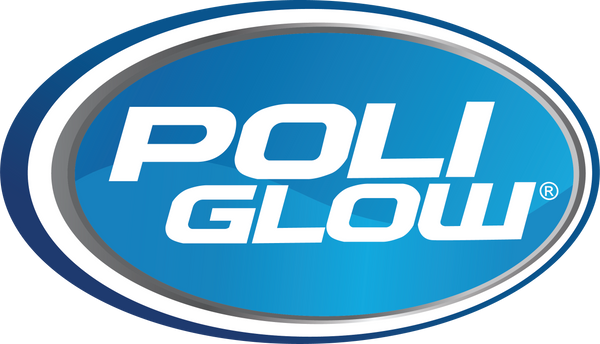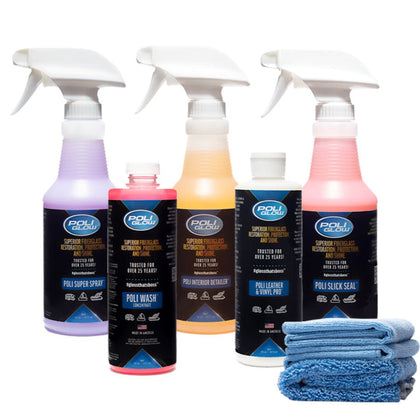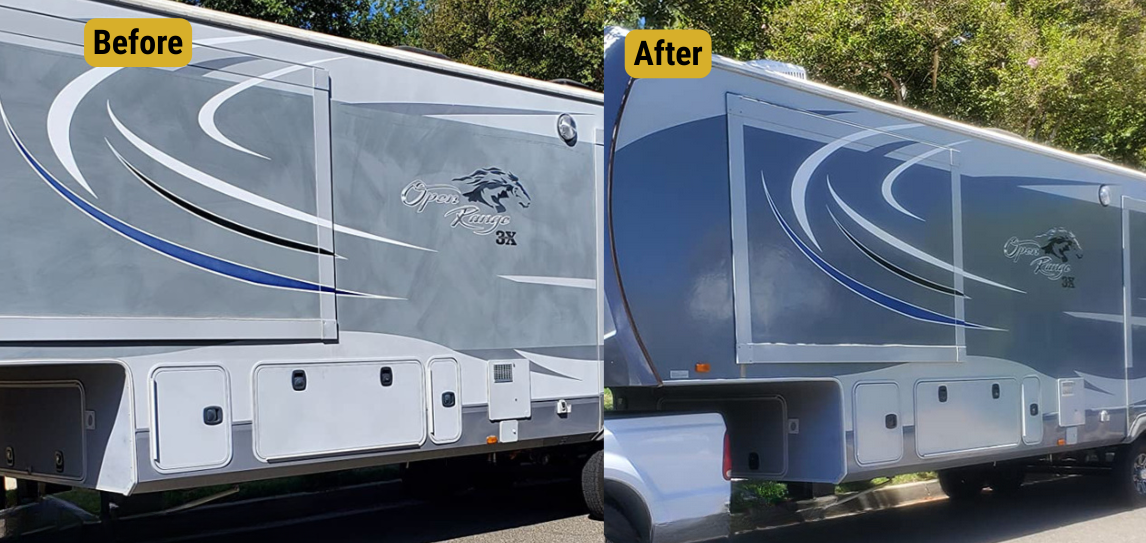
Decoding the Price Tag: Exploring Boat Detailing Costs and Value Proposition
Time to read 13 min
Boat detailing, an essential aspect of marine vessel maintenance, varies in cost based on several factors. But what lies behind the price tag? In this article, we'll break down the components that influence boat detailing costs and evaluate the value proposition offered by different services. Whether you're a seasoned boat owner or a novice, understanding these costs can be pivotal in making informed decisions about the care and upkeep of your prized vessel.

Introduction to Boat Detailing
Boat detailing is a comprehensive cleaning and restoration process that targets both the interior and exterior of marine vessels. This meticulous procedure encompasses deep cleaning, polishing, and waxing of the boat's surfaces, from the hull to the deck and interior compartments.
The importance of detailing extends beyond mere aesthetics. Regular detailing helps maintain and, sometimes, even enhance the boat's resale value. It's pivotal in preserving the boat's appearance and structural integrity.
The marine environment, characterized by saltwater, UV rays, and various pollutants, can significantly degrade a boat over time. Detailing provides a protective barrier, effectively reducing the detrimental impact of these elements. The result is a boat that boasts a renewed shine and luster and an extended lifespan.
Furthermore, safety remains paramount in the marine world. A well-maintained boat is less susceptible to structural damages that could compromise its security. Clean surfaces and clear decks also mitigate the risk of slips and other onboard accidents. Beyond the immediate benefits, regular detailing serves as a proactive measure. It allows boat owners to detect potential issues, like minor cracks or damages, at an early stage. By ensuring timely repairs, boat owners can avert more extensive, costly problems in the future. Boat detailing is an essential practice for any boat owner who values their vessel's longevity, appearance, and safety.
Factors Influencing Boat Detailing Costs
The cost of boat detailing can vary from one provider to another based on various factors. Below is a comprehensive breakdown of the factors that can influence the cost of boat detailing:
- Size and Boat Type: The boat size and type significantly affect detailing costs. Larger boats require more labor hours and materials for detailing, leading to higher costs. A yacht will naturally cost more to detail than a small fishing boat.
- Type of Service: The type of service requested can influence the cost of boat detailing. Basic cleaning services might be less expensive than comprehensive detailing, including polishing, waxing, and deep interior cleaning. Additionally, specialized treatments, such as ceramic coatings or teak wood restoration, can influence the final cost.
- Condition of the Boat: The current state of the boat substantially impacts cost. A boat that's been neglected or hasn't been cleaned in a long time may have more oxidation, mold, or deep-seated stains. Addressing these issues requires additional effort and specialized treatments, increasing the price.
- Materials Used: Premium quality cleaning agents, waxes, and polishes often come with a higher price tag. If a boat owner opts for high-end products or requests specific brands, this can elevate the detailing cost.
- Geographic Location: Detailing prices can vary significantly based on the region or city where the service is provided. Detailing services in upscale marinas or popular boating areas might be more expensive due to higher operational costs or demand.
- Additional Services: Certain boat detailing providers extend supplementary services that influence the overall cost. Services like engine cleaning, propeller upkeep, canvas treatments, decal removal, and teak wood restoration may entail additional charges.
- Expertise and Reputation: Established detailing companies with a solid reputation and skilled technicians might charge more than newer or less-known providers. The assurance of quality work and professionalism often justifies the price.
- Frequency of Detailing: Regular maintenance is more cost-effective than sporadic and comprehensive detailing. Some detailing companies offer subscription or package deals for regular customers. If a boat owner schedules regular maintenance, they might receive a discount compared to one-time services.
- Seasonal Demand: Just like many services, boat detailing can be subject to seasonal demand. Prices might be higher during peak boating seasons when demand is high.
- Access and Mooring: If the detailing company needs to transport or move the boat to their facility or if they face challenges accessing the boat, additional charges may apply.
When considering boat detailing services, it's essential to understand the factors influencing the price. By recognizing these elements, boat owners can make informed decisions that balance cost with the desired quality of service.
The Breakdown: Typical Boat Detailing Services
Here's a list of some of the typical services offered by professional providers:
- Exterior Cleaning: This involves meticulously cleaning the boat's exterior surfaces.
- Hull: As the submerged part of the boat, the hull often collects marine growth like algae and barnacles. Regular cleaning not only prevents long-term damage but also guarantees smooth sailing.
- Deck and Topside: These upper exterior surfaces need cleansing from contaminants such as dirt, salt, and bird droppings. This maintains the boat's exterior surfaces and safeguards it from the marine elements.
- Interior Cleaning: The boat's interior is pivotal in ensuring comfort and functionality for its occupants.
- Cabins: These main living spaces require routine upkeep to deter mold, mildew, and unpleasant odors. Cabin cleaning includes vacuuming, dusting, and using marine-grade cleaners.
- Heads (Bathrooms): These spaces require comprehensive cleaning and sanitization due to their regular use and inherent humidity.
- Storage Areas: Regular organization and cleaning here prevent clutter and ensure the durability of stored gear.
- Specialty Services: These are specialized treatments that cater to the boat's specific needs.
- Ceramic Coatings: This provides a shiny finish and shields against UV rays, oxidation, and marine impurities. It also eases the cleaning process in the future.
- Anti-Fouling Treatments: Applied to the hull, this prevents aquatic organism growth, ensuring uninterrupted performance and boat durability.
- Teak Cleaning and Restoration: Teak cleaning involves removing dirt and old sealants, followed by a restoration process that may involve oiling or sealing the wood to retain its natural color and resist moisture.
- Metal Polishing: Metal polishing removes oxidation and brings back the luster to metal surfaces, ensuring they remain both functional and aesthetically pleasing.
- Engine Detailing: The engine is the heart of any boat, and its maintenance is critical for safe and efficient operations. Engine detailing goes beyond mere surface cleaning. It involves inspecting the engine for any signs of wear, leaks, or corrosion, cleaning off any accumulated grime or deposits, and applying protective lubricants where necessary. This process ensures optimal performance and extends the engine's lifespan by preventing potential issues from escalating.
Boat detailing is a multifaceted process encompassing both aesthetic and functional services. Proper detailing is pivotal to maintaining a boat's condition, ensuring optimal performance, and preserving its value.
The Value Proposition: Is It Worth the Price?
While there is a cost associated with boat detailing, the practice provides numerous benefits that make it worth the price tag. Here are some of the benefits offered by boat detailing:
- Preservation of the Boat's Value: Regular boat detailing plays a pivotal role in maintaining critical components of the boat, such as paint, gel coat, and other surfaces. By ensuring these elements are in top condition, boat owners can prevent premature wear and tear, degradation, or discoloration, effectively preserving or even enhancing the boat's market value over time.
- Enhanced Appearance and Pride of Ownership: A well-maintained boat is not just about value in monetary terms. A sparkling, well-kept boat is a source of pride for its owner. Owners ensure that their boats always look their best by employing professional detailing services, reflecting a sense of commitment and pride in ownership. This can significantly enhance the boating experience, making every voyage enjoyable.
- Prolonging the Life of Materials: Boat materials, especially those exposed to the elements, are susceptible to damage from various factors, including the sun's UV rays. For instance, if left untreated, seating areas can crack, fade, or degrade due to prolonged UV exposure. Professional boat detailing incorporates treatments that offer protection against such detrimental effects, thus extending the lifespan of materials and reducing the need for frequent replacements or repairs.
- Safety Considerations: Safety on board is paramount, and a clean boat directly contributes to this. A thorough cleaning ensures decks are free from slippery algae or residue, leading to a safer environment for movement. Additionally, clean windows and windshields, achieved through meticulous detailing, provide unobstructed views crucial for navigation and overall safety while on the water.
The value proposition of professional boat detailing extends beyond mere aesthetics. It's an investment that ensures the boat retains its worth, offers a safer environment, and gives the owner a sense of pride and satisfaction, making every nautical journey truly memorable.
DIY vs. Professional Boat Detailing
The decision between performing the detailing process yourself or opting for professional services involves considering multiple factors. Let's explore the fundamental elements that set these two approaches apart:
Cost Analysis:
- DIY Approach: Undertaking boat detailing on your own necessitates acquiring specific products and tools. While the initial outlay might seem substantial, it's a one-time investment that could be spread over multiple detailing sessions. However, one must also consider potential inefficiencies, such as purchasing the wrong products or quantities leading to waste.
- Professional Services: Engaging in a professional service typically involves a fixed fee. While this might seem more expensive at first glance, these services benefit from economies of scale by purchasing products in bulk and using them optimally. The comprehensive nature of their service can often translate into cost efficiencies over time, especially when considering the avoidance of DIY mistakes and inefficiencies.
-
Time Consideration:
- DIY Approach: The boat detailing process can be lengthy for the uninitiated. The time spent includes cleaning and maintenance and the learning curve of understanding the right techniques, products, and applications.
- Professional Services: Experienced professionals with proven methods and strategies can typically complete boat detailing much faster. Their efficiency stems from familiarity with the process, allowing them to achieve comprehensive results in a fraction of an amateur's time.
-
Quality and Longevity of Results:
- DIY Approach: While there's a sense of personal satisfaction in detailing one's boat, the results can be inconsistent, especially during the initial attempts. Furthermore, the protective and aesthetic effects might not last as long if the right products or techniques aren't applied.
- Professional Services: Professionals bring to the table a depth of knowledge regarding boat materials, their vulnerabilities, and the best maintenance techniques. As such, they can consistently deliver high-quality results that not only enhance the immediate appearance of the boat but also ensure extended protection against the elements. This expertise often translates into longevity, with the results of a professional detailing session outlasting those of a DIY effort.
Ultimately, the choice between DIY and professional boat detailing hinges on your priorities, available resources, and your boat's unique needs. Many boat owners strike a balance, undertaking routine maintenance personally and engaging with a professional boat detailer for specialized or time-demanding tasks.
How Often Should You Detail Your Boat?
Determining the frequency of boat detailing is essential for maintaining the vessel's appearance, functionality, and overall lifespan. Various factors influence this decision, and understanding them can guide boat owners toward an optimal maintenance schedule.
- Usage Frequency: Boats that are used regularly accumulate dirt, salt, and contaminants faster than those used sporadically. If you take your boat out every weekend or more frequently, it's recommended to have a basic cleaning after each use and a more thorough detailing every 2-3 months. On the other hand, boats used less frequently may require detailing every 4-6 months.
- Storage Conditions: Boats stored in the open are more exposed to environmental factors such as UV rays, rain, bird droppings, and airborne contaminants. Such vessels would benefit from a detailing session every 3-4 months. Extend this to every six months if your boat is stored indoors or under a protective cover.
- Type of Water: Saltwater is more corrosive than freshwater. Boats that navigate in marine environments are more prone to salt deposits, which can lead to oxidation and corrosion if not addressed promptly. Such boats should be rinsed with fresh water after every use and detailed more frequently, ideally every 2-3 months. Freshwater boats can have a slightly extended detailing interval.
- Seasonal Changes: Thorough detailing is advisable before winterizing your boat or storing it for an extended period. This prepares the vessel for the off-season by ensuring contaminants won't sit on the surfaces for prolonged periods. Similarly, detailing at the start of boating season ensures the boat is in prime condition.
- Visible Signs: Independent of the above guidelines, if you notice visible signs of dirt accumulation, dullness, oxidation, or any imperfections on your boat's surfaces, it's a clear indicator that it's time for a detailing session.
While generalized timelines can guide boat owners, the specific detailing frequency will depend on individual usage patterns and environmental exposures. Regularly inspecting your boat and being proactive in its maintenance will ensure that it remains in excellent condition and serves you well for years.
Tips for Choosing the Right Boat Detailing Service
Selecting the appropriate boat detailing service is crucial not only for your vessel's aesthetics but also for its longevity and functionality. The following tips will guide boat owners in making an informed decision when seeking professional detailers:
- Research and Reputation: Look for professional detailers with a solid reputation. Online reviews, testimonials, and recommendations from fellow boat owners can offer invaluable insights into the quality of service provided.
- Experience and Training: The intricacies of boat detailing differ from regular vehicle detailing. Ensure that the chosen provider has adequate expertise to handle your boat type. Ask about their training processes and whether their technicians are certified or have undergone specialized courses.
- Equipment and Products Used: Inquire about the tools and products the providers use during their detailing process. High-quality, marine-specific products should be the norm, as these are formulated for the unique needs of boats.
- Comprehensive Service List: A good boat detailing service should offer a range of services, from exterior cleaning to engine detailing. Ensure they can cater to your specific needs, whether it's ceramic coatings, anti-fouling treatments, or other specialty services.
- Insurance and Licensing: Always choose a detailing service that's licensed and insured. This signifies professionalism and provides a safety net in the rare event of accidental damage.
- Transparent Pricing: Opt for services that offer transparent pricing without hidden costs. Getting a written estimate upfront detailing the scope of work and associated costs is advisable.
- Environmental Considerations: Boat detailing can involve chemicals and waste. Ensure the service follows environmentally-friendly practices, disposing of products responsibly and using eco-friendly alternatives where possible.
- Turnaround Time: While you'd want your boat to be detailed thoroughly, knowing how long the process will take is also essential. A clear timeline allows you to plan accordingly.
- Customer Service: A company's approach to customer service can tell you a lot about its overall ethos. Opt for responsive, courteous companies that are willing to address any questions or concerns.
- Guarantee or Warranty: Some detailing services might offer a satisfaction guarantee or a warranty on specific treatments. This can be an added reassurance of the quality of work they deliver.
Entrusting your vessel to a boat detailing service is an investment in its upkeep and longevity. By considering the above factors and conducting thorough research, boat owners can ensure they select a service that aligns with their expectations and delivers value for money.
Maintaining Your Boat Post-Detailing
After investing time and resources into a professional boat detailing service, it's imperative to engage in regular maintenance to preserve the boat's pristine condition. Here are some steps to ensure your boat remains in top shape post-detailing:
- Regular Rinse: Saltwater, dust, and other contaminants can accumulate on the boat's surface. Rinse the boat thoroughly with fresh water after every outing, especially in saltwater. This simple act can prevent salt buildup and subsequent corrosion.
- Use Marine-Specific Cleaners: When cleaning, always opt for marine-specific cleaners. These are formulated to be gentle on the boat's surfaces while effectively removing marine contaminants.
- Avoid Direct Sunlight: Prolonged exposure to UV rays can degrade your boat's finish, leading to fading and oxidation. Store your boat under a canopy or in a garage, or use boat covers to protect it from direct sunlight.
- Regularly Check Seals and Seams: Inspect seals, seams, and joints regularly for signs of wear or damage. Address any issues immediately to prevent water intrusion or structural complications.
- Ventilate the Interior: Moisture accumulation inside the boat can lead to mold and mildew. Always ensure proper ventilation to keep interiors dry, especially after a wet outing.
- Reapply Protective Treatments: Adhere to the recommended reapplication schedule if your boat has been treated with protective coatings, such as UV protectants or anti-fouling treatments.
- Maintain a Wax Schedule: While detailing involves a wax application, maintaining a regular waxing schedule post-detailing can offer continued protection against contaminants and UV rays, enhancing the boat's shine.
- Address Spills Immediately: Accidental food, drink, or bait spills can lead to stains. Tackle any spills promptly to prevent lasting marks.
- Monitor Engine and Mechanical Components: Detailing may include engine cleaning, which can extend its lifespan. However, regular checks for signs of wear, corrosion, or leaks and timely maintenance are essential for optimal performance.
- Use Quality Fenders: When docking, quality fenders can prevent scuff marks or dings on your boat's hull, preserving the detailing work.
While professional detailing provides a deep cleanse and rejuvenation for your boat, maintaining this high standard requires regular care and attention. Implementing these post-detailing practices will uphold your boat's appearance and enhance its longevity and performance.
Amid the exploration of boat detailing costs and the inherent value they offer, one option that merits consideration is Poli Glow® – a specialized solution tailored for boat owners seeking effective and lasting results. Poli Glow® stands apart from conventional boat detailing methods, providing a comprehensive restoration and protection system designed specifically for boats and RVs. With products like Poli Prep®, Poli Ox®, and Poli Glow®, this approach involves removing oxidation, preparing the surface, and applying a durable, high-gloss finish that adheres exceptionally well to boat surfaces. Poli Glow's® unique system offers not only enhanced aesthetic appeal but also extended protection against oxidation, making it a compelling choice for boat owners who value both quality and longevity in their investment.






